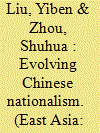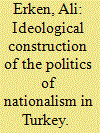| Srl | Item |
| 1 |
ID:
101975


|
|
|
|
|
| Publication |
2010.
|
| Summary/Abstract |
The article seeks to challenge the implicit equation made between national autonomy and personal freedom. Post-socialist Mongolian identity, articulated on a notion of resistance against Chinese territorial and biological encroachment, is accompanied by an explicit, often violent, anti-Chinese discourse. This resistance against an external enemy also has a centripetal effect on Mongolian society, and contemporary notions of Mongolianness tend to congeal into a homogenised identity that leaves little space for personal reinterpretations. For those whose voices are not heard, such as Mongolian women and gay men, 'freedom to be ethnic' can be far from liberating. The data I present in this article suggest that, while it is routinely depicted as the main danger against which to rally, China can, for some people, open up spaces of opportunity and liberty unattainable to them within Mongolia.
|
|
|
|
|
|
|
|
|
|
|
|
|
|
|
|
| 2 |
ID:
097912


|
|
|
| 3 |
ID:
170699


|
|
|
|
|
| Summary/Abstract |
Nationalist discourse has long been an important apparatus in modern politics. This paper showed a sharp, yet subtle departure of the Chinese government in its current manipulation of nationalism. Instead of the hardcore revolutionary rhetoric, the new phase of nationalist discourse incorporated many elements of Confucianism to better consolidate the communist regime. Using the 2015 military parade as an example, this paper analyzed how the Chinese central government evoked sentiments and consciousness of nationalism by utilizing and interweaving Confucianism elements of family value, benevolent (Ren), propriety (Li), equilibrium, and harmony into the party-state’s official nationalist discourse. Significance of such organized endeavors in political discourse is discussed.
|
|
|
|
|
|
|
|
|
|
|
|
|
|
|
|
| 4 |
ID:
131989


|
|
|
|
|
| Publication |
2014.
|
| Summary/Abstract |
This article analyzes the ideological evolution of Turkish nationalism in politics from 1965 to 1980 providing an in-depth analysis of the ideological contours of the Cumhuriyetçi Köylü Millet Partisi (CKMP; Republican Peasant Nation Party) and its successor the Milliyetçi Hareket Partisi (MHP; Nationalist Movement Party). It shows that there were different channels for indoctrination promoting their own view of nationalism within the movement. It also aims to demonstrate that a tangible shift in the nationalist discourse of the party took place during this period, concomitant to the change of the agents of political nationalism. This transfer of ideological power was reflected in the party's gradually transforming political discourse, swinging from secular nationalism to the margins of religious-conservative nationalism.
|
|
|
|
|
|
|
|
|
|
|
|
|
|
|
|
| 5 |
ID:
121870


|
|
|
|
|
| Publication |
2013.
|
| Summary/Abstract |
The Alka is a traditional game in Croatia, held to commemorate the victory of the local warriors of the region of Cetina over the Ottoman army in 1715. The Croatian nationalist discourse of the 1990s tried to reinvent the Alka as symbol of a certain national identity, by nationalising this local event and emphasising its religious aspect. In a period of just over a decade, however, the project of reinventing the Alka has failed completely. This paper analyses the reinvention of the Alka and its failure in order to argue that concrete cases of invented tradition are context dependent and may encounter practical limits.
|
|
|
|
|
|
|
|
|
|
|
|
|
|
|
|